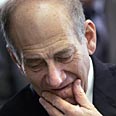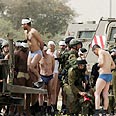
Olmert. No particular risk
Photo: AFP

Wide consensus. Jericho arrests
Photo: Reuters
Two weeks before an election, all politicians are suspect that election considerations just might color their thinking about things like Tuesday's Jericho operation.
It happens everywhere, not just in Israel, and in the current example, the operation was pretty insignificant, supported by a much wider consensus, than other, similar moves in the past.
Other examples include the 1981 blowing up Iraq's nuclear reactor, or the 1996 Operation Grapes of Wrath, both of which occurred on the eve of elections. In both cases, it was legitimate to ask whether Menachem Begin and Shimon Peres gave at least some consideration to the affects of those operations at the voting booth.
Olmert took no particular risk by going to Jericho. He knew he would enjoy from both right- and left-wingers, and that it would be very easy to translate Hamas' arrogance about releasing Zeevi's killers into a national consensus about the need to arrest them.
Other ideas
In this context, the move jells nicely with other ideas Olmert has put forth of late, and is a signal that the Kadima Party has once again taken the initiative. After being weaned from the "no mistakes" theory that has silenced him since he took over from Ariel Sharon in January, the acting prime minister is now the one to dictate the issues for debate, and he forces those who disagree with him to respond.
The Likud's response to Kadima's initiative has been confused (including changes to its diplomatic platform, something that only strengthens the impression of panic gripping the party); over in Labor, the leaking of secret messages, which in actuality were there the whole time, that suggest the party should now position itself as a junior coalition partner to Olmert.
Either way, Olmert is the initiator.
This still doesn't say that the election results are a sure thing. Anyone reading the polls correctly understands that the picture is much more complex than pure numbers, which in any event point to unusually high numbers of people who've yet to decide who to vote for.
Cold shoulder
But not everything is elections. Tuesday's IDF operation, along with signifying the desertion of a great many international factors, signifies the final crumbling of any appearance of self rule in the territories.
Both Hamas and Mahmoud Abbas now have a perfect excuse not to take any responsibility – the Palestinians have always been champions of such a path in any event.
Israel pays them no consideration, the world turns a cold shoulder, and the Palestinians stand to drown in a sea of chaos, worse than anything they've known up to now.
It doesn't really matter to the average Israeli voter, immersed in a state of mind about disengagement, gathering in, or whatever else Kadima's campaign masters call the feeling of, "leave me alone about the Palestinians, about tomorrow, and about the world" amongst a wide swath of the public.
No disengagement
But it could very well matter to us. After all, disengagement is but a fantasy. There is no way to really build a wall and to hide behind it, as Olmert suggests. Palestinian chaos will make its way to us. A humanitarian catastrophe in the territories will make its way across the border. It won't happen before the elections, but there will also be life after March 28.
In this context, we would do well to remember: The PFLP is a small, well-organized organization that has played a relatively small part in the fighting in the territories. The murder of Rehavam Zeevi was, as far as the organization is concerned, justified revenge for the assassination of the group's secretary general, Abu Ali Mustapha. Therefore, we must take the group's promise of revenge seriously.
We would do well to understand that the PA's disintegration brings closer the day on which Hamas will no longer have an interest in maintaining a ceasefire. You can believe that would happen in any event. You can think, as many Israeli leaders do, that all the Palestinians are made of the same cloth, and there is no one to talk with, and nothing to talk about.
We would be wise to remember that the relative quiet we've enjoyed for the last two years was largely a product of Palestinian expectations of disengagement. The quiet was a clear Palestinian interest.















